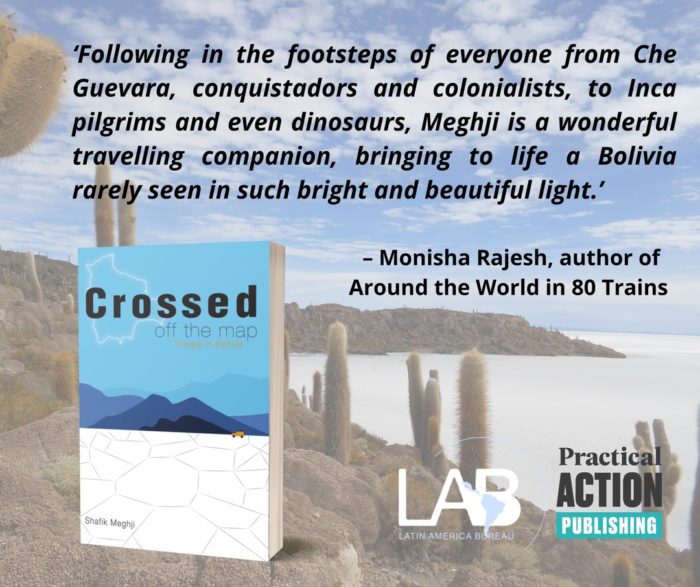
Shafik Meghij’s new title, Crossed Off The Map: Travels in Bolivia is now available to pre-order from our partner, Practical Action Publishing. LAB Patrons (paid subscribers) can read an exclusive excerpt from the brilliant new book from today. If you’d like to take a sneak peek, simply sign up to LAB’s Patreon here.
A bonus episode of our Women Resisting Violence podcast will be released on 8 March – International Women’s Day. This instalment, produced Janno Media, contextualises the powerful stories of transformation and solidarity showcased in the Women Resisting Violence podcast and is based on an online discussion in which we presented the project, caught up with members of the women’s organisations and spoke to Latin America podcast producers about contemporary forms of activism and collaboration across borders.
LAB will be collaborating with the University of Liverpool on the conference Solidarity with Latin America, to be held online April 4 & 5, 2022. If you are interested in presenting as a researcher or practitioner of solidarity, respond to the call for papers by February 28.
News from the region
Brazil
The chess board is set for the upcoming Brazilian presidential election, in October and November later this year. There are currently two strong contenders. Far ahead in the opinion polls is former president Luiz Inácio Lula da Silva, followed some way behind by the current president, Jair Bolsonaro. Several recent polls show that Lula is preferred by some 40 to 46 per cent of voters, while Bolsonaro is supported by about 19 to 23 per cent. Alvaro Crósta and Alistair Clark ask whether the Bolsonaros (Jair and his sons) will allow the victory, or play the Trump card?
Brazil’s FIOL railroad project has been met with strong opposition from communities along its entire length. Despite the government’s promise that new infrastructure will spur development and job creation in the region, activists claim that it has so far resulted in conflicts, loss of livelihoods and environmental damage. Kinga Harasim reports.
Mexico
It is almost 12 years since the Mexican government ‘declared war on violence’. Since then, there have been thousands more homicides and people declared missing. Narcoculture and violence have become normalised in Mexican society. Everyone is affected, but none more so than children, who exhibit more aggressive behaviour and violent play. Ana Karen Reyes, a Mexican teacher and junior researcher analyses the normalisation of violence which is threatening children at school and at home.
Argentina
Protests returned to the streets of Chubut, Patagonia, after the Provincial Legislature approved The Mining Activity Rezoning Law, which would allow activity in Telsen and Gastre, despite the fact communities recently rejected mining in a referendum and the province has had legislation prohibiting open-pit mining since 2003. Things heated up when security forces in riot gear confronted the crowds, fired rubber bullets and tear gas and used extreme violence to make arrests, as denounced in social media. Kinga Harasim reports.
Professor Jelke Boesten, leader of the Gender Studies Network at King’s College London and a researcher on our Women Resisting Violence project joins Veronica Gago, leader of Argentina’s #NiUnaMenos movement and the author of ‘Feminist International: How to Change Everything’, to ask: How has the feminist movement been democratised? What differentiates the feminist strike front from the conventional labour strike? And how do we bring feminist activism into the everyday?
Cornelia Gräbner focuses on the courage of women political prisoners held in prisons such as Villa Devoto, in Buenos Aires province, arrested as subversives, under the laws put in place as part of the ‘state of exception’. “They were detained under ‘executive order’, which meant that there was no trial and no predicted release date.”
Film
Two films reflecting the anxieties of 1960s-70s Latin America, and the hopes of New Latin American Cinema, De cierta manera / One Way Or Another (Sara Gómez, 1974) and Yawar Mallku / Blood of the Condor (Jorge Sanjinés, 1969) will be screened at the beginning of March at the Barbican Centre, alongside modernist films from Iran, India, Senegal/France and the USSR. Details here.

Our friends at Cine Latino will be hosting the third Cine Latino Festival in the UK from March 8 – April 8, screening 12 films from Guatemala, Brazil, Argentina and Mexico online. Don’t miss it! More details here.
Patreon
LAB Patrons received exclusive access to an interview with a community organiser from San Basilio de Palenque, Colombia, about reviving ancestral cultural practices of herbal and medicinal cultivation for survival and nourishment. Today, Patrons get a sneak peek inside Shafik Meghij’s new title, Crossed Off The Map: Travels in Bolivia. Sign up here for exclusive books, content and to read LAB’s quarterly guest-written dispatch, Voz.
Sign up to LAB’s Patreon here.

👍🏼